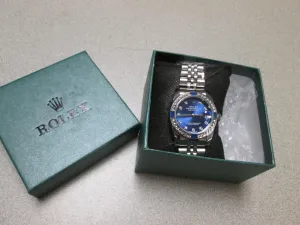CHICAGO–At the Chicago O’Hare’s International Mail Branch, U.S. Customs and Border Protection (CBP) officers intercepted two shipments containing a total of 354 counterfeit designer products on March 20.
Both parcels were arriving from Thailand and, had the items been authentic products the Manufacturer Suggested Retail Price (MSRP) would have been over $398,000. Proceeds from the sale of counterfeit goods have been found to fund criminal organizations who are often also involved in money laundering, drug trafficking, and other illicit trade.
CBP officers examined the first shipment to determine its admissibility and discovered the following counterfeit designer items: sunglasses bearing trademarks owned by Chanel, Louis Vuitton, Burberry and Fendi; watches bearing Louis Vuitton, Chanel, and Rolex trademarks; necklaces bearing Louis Vuitton, Chanel, and Tiffany trademarks; earrings bearing Chanel, and Versace trademarks; and pendants and bracelets bearing Chanel trademarks. This shipment was heading to a residence in Mumford, Tennessee and would have been had a MSRP of $231,333, had the merchandise been genuine.
In the second package, heading to a residence in San Juan, Texas, officers found the following counterfeit designer items: earrings bearing trademarks owned by Versace, Yves Saint Laurent, Prada, Christian Dior, Fendi, Hermes, Michael Kors, Gucci, Chanel, Tory Burch, and Louis Vuitton; scarves bearing Louis Vuitton and Gucci trademarks; and belts bearing Gucci and Louis Vuitton trademarks. The MSRP for these items would have been $147,000 if the merchandise were genuine.
All the merchandise was seized for bearing counterfeit marks when imported into the United States.
“This is just another example of the work our officers do to protects consumers and the U.S. economy,” said LaFonda D. Sutton-Burke, Director, Field Operations, Chicago Field Office. “As consumers increasingly purchase from online or third-party vendors, our officers are at the frontline to guard against defrauders expecting to make money selling fake merchandise.”
The rapid growth of e-commerce enables consumers to search for and easily purchase millions of products through online vendors, but this easy access gives counterfeit and pirated goods more ways to enter the U.S. economy. U.S. consumers spend more than $100 billion every year on intellectual property rights (IPR) infringing goods, falling victim to approximately 20% of the counterfeits that are illegally sold worldwide. The proceeds from the sale of counterfeit goods have been found to fund criminal organizations who are often also involved in money laundering, drug trafficking, and other illicit trade.
Commonly, these goods are sold in underground outlets and on third party e-commerce websites. Online listings will often use images of the genuine designer product, defrauding purchasers who are expecting to receive the real thing.
CBP Trade protects the intellectual property rights of American businesses through an aggressive Intellectual Property Rights enforcement program, safeguarding them from unfair competition and use for malicious intent while upholding American innovation and ingenuity. CBP has the authority to detain, seized, forfeit, and ultimately destroy merchandise seeking entry into the United States if it bears an infringing trademark or copyright that has been recorded with CBP through the e-Recordation program. https://iprr.cbp.gov/s/.
Every year, CBP seizes millions of counterfeit goods from countries around the world as part of its mission to protect U.S. businesses and consumers. These goods include fake versions of popular products, such as smartphones and related accessories, electronics, apparel, shoes, cosmetics, and high-end luxury goods, as well as goods posing significant health and safety concerns, such as counterfeit pharmaceuticals, bicycle and motorcycle helmets, medical devices, supplements and other consumables. Sold online and in stores, counterfeit goods hurt the U.S. economy, cost Americans their jobs, threaten consumer health and safety, and fund criminal activity. Visit the National IPR Coordination Center for more information about IPR including counterfeiting and piracy.
Nationwide in Fiscal Year 2022, CBP seized over 24.5 million shipments of IPR violations that would have been worth just shy of $3 billion, had the goods been genuine. CBP has established an educational initiative to raise consumer awareness about the consequences and dangers that are often associated with the purchase of counterfeit and pirated goods. Information about the Truth Behind Counterfeits public awareness campaign can be found at https://www.cbp.gov/FakeGoodsRealDangers.
CBP encourages anyone with information about counterfeit merchandise illegally imported into the United States to submit an e-Allegation. The e-Allegation system provides a means for the public to anonymously report to CBP any suspected violations of trade laws or regulations related to the importation of goods in the U.S.
CBP’s border security mission is led at 328 ports of entry by CBP officers from the Office of Field Operations. Please visit CBP Ports of Entry to learn more about how CBP’s Office of Field Operations secures our nation’s borders. Learn more about CBP at www.CBP.gov.


